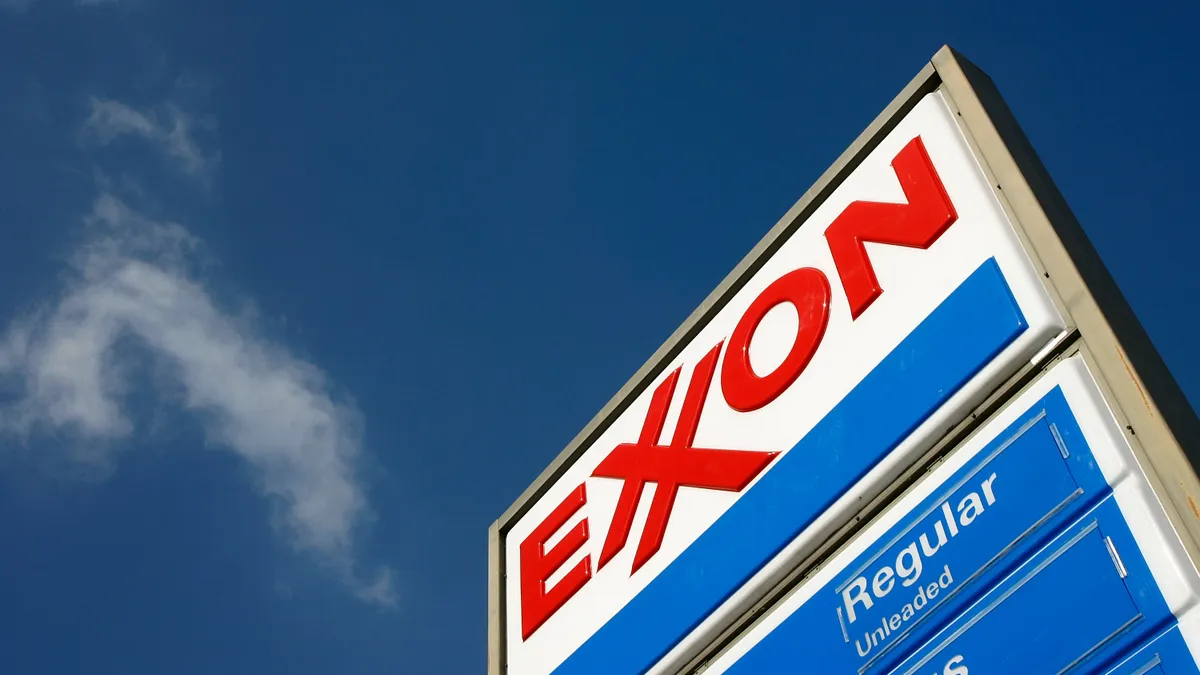Dive Brief:
- A Connecticut court has denied ExxonMobil’s motion to dismiss a lawsuit that seeks to hold the oil major accountable for deceiving the state’s consumers about the harmful impact of its fossil fuel products on the Earth’s climate.
- In his July 23 ruling, Superior Court Judge John Farley gave Connecticut the green flag to proceed with its suit against Exxon, moving the case closer to a court trial. Farley said that by registering to do business in Connecticut, the oil company “consented to jurisdiction.”
- The ruling marks the latest development in Connecticut v. Exxon Mobil Corp., a suit initiated by state Attorney General William Tong in 2020 under the Connecticut Unfair Trade Practices Act. The original complaint alleged Exxon had engaged in a “decades-long campaign of deception” and sought to make the oil major liable for civil penalties of up to $5,000 for each time it violated CUTPA.
Dive Insight:
Farley said the “exercise of jurisdiction” — given Exxon’s business operations in Connecticut — was “consistent with the requirements of due process.”
Exxon filed for a motion to dismiss the suit based on a lack of personal jurisdiction in December 2023, after Connecticut filed an amended complaint the month prior. The amended complaint alleged Exxon’s operations contribute to climate change through its sales of fossil fuels and petroleum products that “emit large quantities of greenhouse gasses responsible for trapping atmospheric heat that causes global warming.”
The Nutmeg State said in its suit that Exxon has engaged in “deceptive greenwashing campaigns” by promoting itself as “environmentally conscious” to sell its products to Connecticut customers, despite allegedly being aware of the harmful impact of the combustion of fossil fuels “as early as the 1950s and 1960s.”
The filing pointed out several ways Exxon’s operations have impacted the state and its citizens. These include its alleged role in causing a rise in sea levels; flooding; extreme temperature spikes; deterioration of air quality; contamination of drinking water; severe storms; a rise in the spread of diseases and even spurring economic consequences.
The suit also alleged Exxon’s conduct has “delayed the needed transition to clean energy in Connecticut … [causing] a significant negative impact on the people of the State of Connecticut.”
In its annual securities filing submitted earlier this year, Exxon said it believed the probability of such lawsuits having a “material adverse effect” on its operations and financial status was “remote.”
“We believe the legal and factual theories set forth in these proceedings are meritless and represent an inappropriate attempt to use the court system to usurp the proper role of policymakers in addressing the societal challenges of climate change,” Exxon said in its filing to the Securities and Exchange Commission.
The oil major said in the filing it would “continue to defend vigorously against these claims.”
Connecticut’s ruling from last week is the latest victory for states and local governments looking to hold Big Oil accountable for climate change.
Last month, California announced it was going after a group of six corporations — including ExxonMobil, Shell, Chevron, ConocoPhillips, BP and the American Petroleum Institute — for their greenwashing practices and asking them to give up “illegally obtained profits.”
Earlier in February, the city of Chicago said it was suing six oil and gas companies — BP, Chevron, ConocoPhillips, ExxonMobil, Phillips 66 and Shell — and the American Petroleum Institute for knowingly deceiving the city’s consumers about the climate change risks associated with fossil fuel products.
Big Oil’s role in climate change has also prompted some of the nation’s largest retirement and pension funds to initiate divestments. The New York State Common Retirement Fund, the third largest public pension fund in the country, said in February it would divest holdings worth approximately $26.8 million from eight oil and gas companies, including ExxonMobil, after reviewing their strategies to shift to a low-carbon economy.











